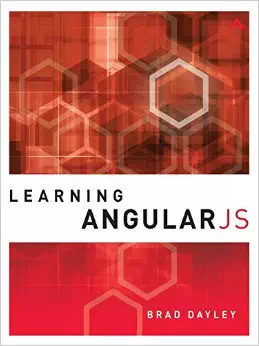| Learning AngularJS |
|
Author: Brad Dayley AngularJS is a very popular choice for a JavaScript web development framework but many say that it isn't the easiest to learn - can this book help? There some problems with AngularJS and one of them is the move to AngularJS 2.0, which is making some big changes to the way things work, see AngularJS 2.0 Is Radically Different. In general new books on AngularJS are on hold until the new version comes out. The problem with this particular book is that it was written when AngularJS looked stable. The book gives no hint that anything is about to change and doesn't even make a big thing about the version it actually uses, which seems to be 1.2. The current version is 1.3 and 1.4 is not far away and the big changes of the promised version 2 are already being felt. Even so there is a potential value in a book that gets you into the heart of AngularJS and explains its structure and approaches. Oddly the book starts with a chapter on JavaScript and Node.js. The reason that this is odd is that you really need to be a good JavaScript programmer to get very far with AngularJS and a better starting point would have been AngularJS itself. The introduction to JavaScript might help refresh your memory but it does nothing to help a beginner. If you don't know JavaScript then get another book and learn how to use it properly before trying to find out about AngularJS. Chapter 2 is where the book really begins and it is about an overall view of AngularJS. It is so high-level that it reads like reference documentation. At the end of it you would be hard pushed to explain to someone else what AngularJS was all about. The first example of an AngularJS project equally does nothing to make you understand what is going on unless you already know. There are also lots of tables that tell you things that you probably don't need to know at this stage - like what commands there are in jQuery Lite. Chapter 3 examines application dynamics and dives into modules and dependency injection. As far as I can tell, if you are a beginner who dosn't yet know what AngularJS is about, being plunged into an abstract but impressive-sounding aspect of using it is unlikely to help. Starting at this point makes AngularJS seem like rocket science and it isn't.
Chapter 4 moves on to understanding scope, which is something that is going to change a lot in version 2. Chapter 5 is about templates, which is a bit more basic and would probably make a better starting point. Unfortunately even here it is difficult to see the bigger picture. Brad Daley is, however, fairly comprehensive in his treatment of AngularJS. Chapters 6 and 7 are about directives; 8 deals with events, 9 and 10 are on services and 11 brings it to a close with creating application components. The book goes a fair way into AngularJS, but not so far that it would be considered expert material. The real problem with the book is that it fails to provide a bridge for the beginner to get to the more advanced ideas. Despite its title, it really isn't about learning AngularJS because there is no real attempt to teach the basics, only to describe and classify the overall approach. It just doesn't make AngularJS seem simple and in many places it is more like unfriendly documentation than a user-friendly book. Not for the beginner and, if you are a beginner, you should probably wait for the books covering AngularJS 2.0 to appear.
|
|||
| Last Updated ( Wednesday, 06 May 2015 ) |

